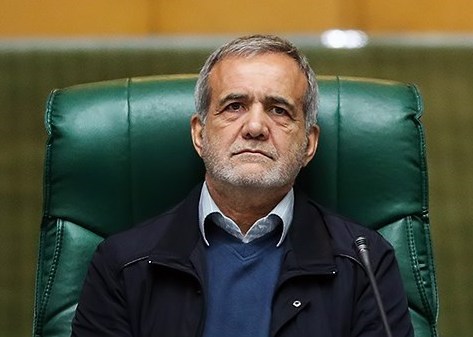Newly elected Iranian president Masoud Pezeshkian pledges continued support for Hezbollah and condemned Israel’s actions in Gaza
Tehran: On Monday, Iran’s president-elect Masoud Pezeshkian reaffirmed the Islamic Republic’s steadfast support for Lebanon’s Hezbollah group. This statement marks one of Pezeshkian’s first foreign policy pronouncements following his victory in Friday’s presidential election runoff. The statement, addressed to Hezbollah’s chief Hassan Nasrallah and disseminated via Iran’s IRNA news agency, underscores Tehran’s ongoing financial and military backing of Hezbollah, a relationship that dates back to the group’s formation by Iran’s Revolutionary Guards during Lebanon’s civil war in 1982.
In his address, Pezeshkian emphasized that supporting Hezbollah and other allied resistance groups is a core tenet of Iran’s policy. He expressed confidence that the “resistance movement” would thwart Israel’s “warmongering and criminal policies” in Gaza, where Israel has been in conflict with Hamas, a Palestinian ally of Hezbollah, for the past nine months. This prolonged conflict has seen frequent exchanges of fire between Hezbollah and Israel over Lebanon’s border, raising international concerns about the potential for a broader war.
Embed from Getty ImagesEarlier the same day, Iran’s foreign ministry spokesman, Nasser Kanani, reiterated Tehran’s commitment to supporting Lebanon and cautioned Israel about the repercussions of any aggressive actions in the region, particularly towards Lebanon. This steadfast support aligns with Pezeshkian’s broader foreign policy stance, signalling no significant shift from previous administrations.
The recent presidential election saw reformist Pezeshkian defeat ultraconservative Saeed Jalili, a former nuclear negotiator, following the untimely death of President Ebrahim Raisi in a helicopter crash. This election outcome has been interpreted by some, including Israeli Foreign Minister Israel Katz, as a clear demand for change and opposition from the Iranian populace.
On Saturday, Nasrallah congratulated Pezeshkian on his electoral victory, highlighting Tehran’s enduring role as a robust supporter of regional resistance groups. Hezbollah, a Shia Muslim organization, is a pivotal component of the Axis of Resistance, an alliance of pro-Iran armed movements opposing Israel and the United States.
Analysis:
Political: Pezeshkian’s reaffirmation of support for Hezbollah highlights the entrenched political relationship between Iran and the Lebanese group. This support is a cornerstone of Iran’s foreign policy, influencing regional dynamics and aligning with its broader goal of countering Israeli and U.S. influence in the Middle East. The statement also signals continuity in Iran’s foreign policy, suggesting that Pezeshkian’s administration will maintain, if not strengthen, the Islamic Republic’s traditional alliances and adversarial stance towards Israel.
Social: The president-elect’s statement has significant social implications both within Iran and in the broader Middle East. Domestically, it reinforces the government’s narrative of resistance against perceived external threats, a theme that resonates with a substantial segment of the Iranian population. Regionally, the unwavering support for Hezbollah bolsters the morale and legitimacy of various resistance groups, potentially galvanizing their base and escalating ongoing conflicts.
Racial: Hezbollah’s support base primarily consists of Shia Muslims, mirroring the sectarian divide in the region. Iran’s backing of Hezbollah strengthens Shia solidarity against Sunni-majority adversaries like Saudi Arabia and Israel. This sectarian alignment fuels the ongoing geopolitical struggle, intensifying regional tensions and perpetuating cycles of violence. Pezeshkian’s support for Hezbollah reinforces the racial and sectarian dimensions of these conflicts, highlighting the deep-rooted and complex nature of Middle Eastern geopolitics.
Gender: While Pezeshkian’s statement does not explicitly address gender issues, the broader context of resistance movements and military conflicts has significant gender implications. Women and children often bear the brunt of the humanitarian crises resulting from these conflicts. Increased support for groups like Hezbollah can lead to prolonged instability, exacerbating the challenges faced by vulnerable populations. On the other hand, resistance movements sometimes offer women opportunities for leadership and participation in ways that traditional structures do not, presenting a paradoxical impact on gender dynamics.
Economical: Iran’s continued support for Hezbollah involves substantial financial and military resources. This allocation of resources has domestic economic implications, particularly in a country already grappling with sanctions and economic challenges. The economic burden of supporting regional allies must be balanced against domestic needs, potentially fueling internal discontent if economic conditions do not improve. Moreover, the ongoing conflict and instability can disrupt regional trade and financial activities, affecting Iran and the broader Middle Eastern economy.
